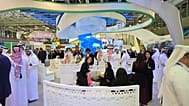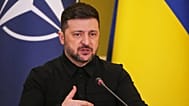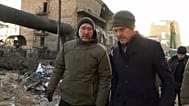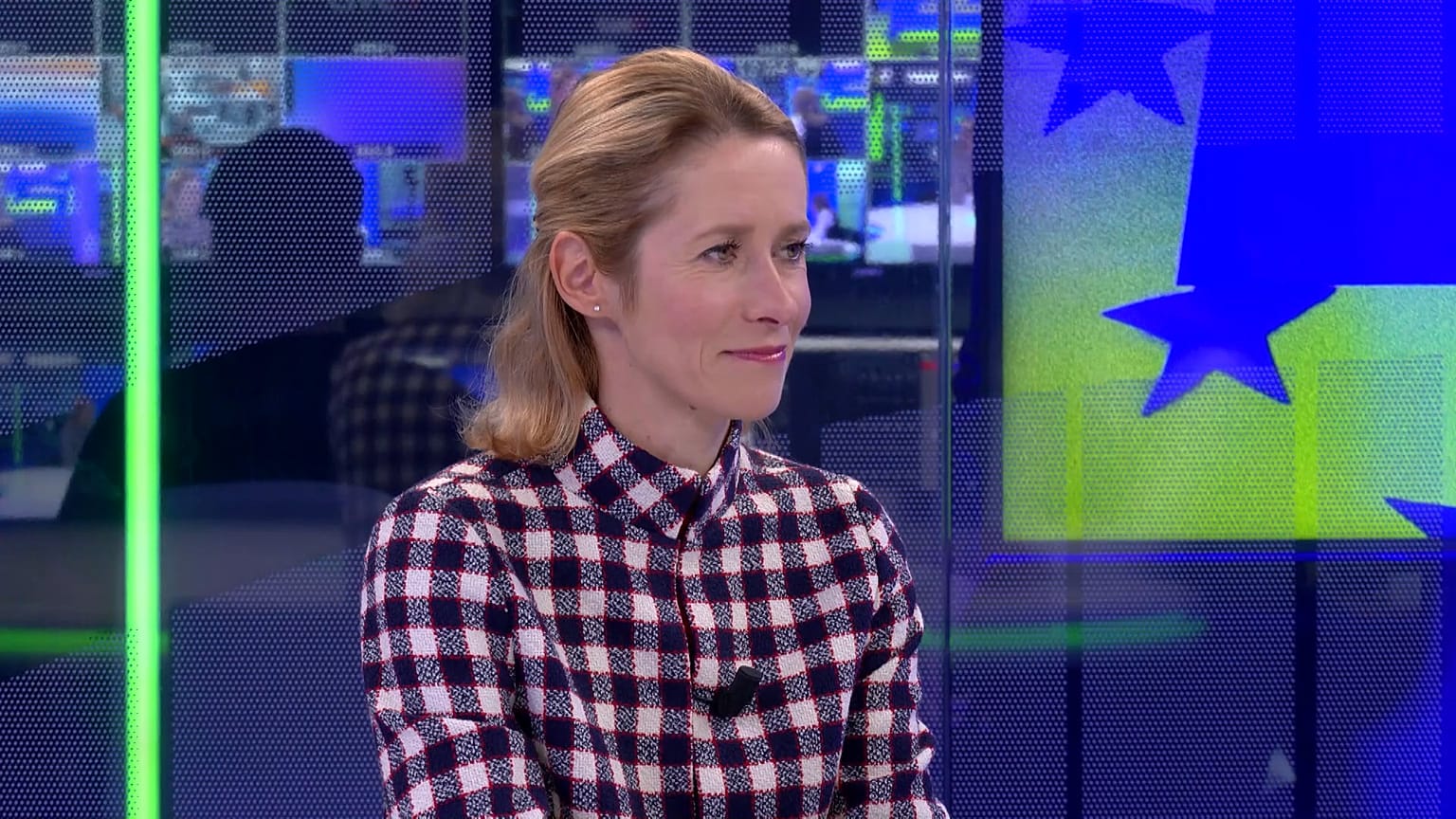EU foreign policy chief Kaja Kallas is urging EU member states to support proposals to suspend the trade part of the EU-Israel Association Agreement. The European Commission has published an option paper for the EU to reimpose duties on EU-Israel trade in response to Israel’s assault on Gaza.
In an interview with Euronews, EU High Representative for Foreign Affairs Kaja Kallas confirmed the strategy to suspend trade-related provisions within the Israel-EU Association Agreement.
The EU is Israel’s biggest trading partner. "We have a trade of 42.6 billion euros with Israel, in 2024. So, it is a significant amount. And when it comes to the preferential treatment, then 37% of that trade really has preferential treatments. So definitely this step will have a high cost for Israel", Kaja Kallas confirmed.
However, it’s up to EU member states to decide if the measure can pass, and so far, several member states have continuously blocked efforts to sanction Israel due to voting requirements.
Germany, Italy, The Czech Republic, Austria, Hungary, Bulgaria have resolutely prevented the EU from responding to Israeli breaches of international law, including breaches to Article 2 of the EU-US Association Agreement.
"The matter must be agreed among a qualified majority of member states, meaning at least one of the larger countries – Germany or Italy – will have to support the bid if it is to succeed", she said.
Kallas says if Germany and other countries are not willing to get behind EU-led submissions such as trade sanctions to pressure Israel, then they should come up with their own plans. “If you don't support these measures, then what measures can you support?”, she told Euronews’ Europe Conversation. “Bring alternatives”, she said.
“At the same time, Germany has done a step when it comes to halting arms deliveries to Israel, which is a significant step also from Germany's side, and considering their public opinion, it has been difficult for them as well”, she said.
"Putin is just mocking"
On Ukraine, the EU's HRVP (High Representative Vice President) said "Putin is just mocking" all of the recent efforts at ending the war by the US.
"If you think about the meetings in Alaska, what happened afterwards is just Putin increased its attacks. It was the biggest ever aerial attack against Ukraine, now incursion against Poland. It should give us all a very clear understanding what we are up against", she told Euronews.
Kallas also warned Russia was "testing" the West, and sowing division in EU countries to try to reduce support for Ukraine.
"Putin is clearly testing the West, how far he can go, and now it's up to us what is our response and how strong that is, how we let them", she said.
" What we have to keep in mind is that Putin also wants to sow fear inside our societies so that our governments would refrain from supporting Ukraine, because, you know, saying that you don't want this war here, so don't support Ukraine, let the Russians have what they want", she told Euronews.
Read the interview with Euronews’ Shona Murray below, and watch it in its entirety in the player above.
Q. Now we have this unprecedented announcement by the European Commission to suspend trade provisions within the EU-Israel Association Agreement. I mean, can you tell us a little bit more of the details on this, because of course it is unprecedented, but the other question is, will it pass amongst the member states?
A. Well, that is always the question. Remember, in July, I gave the options to European Council, also the foreign ministers, what are the tools to really pressure Israeli government to change course? Because if everybody agrees on the diagnosis, then the question to us is, what do we do about this? And then now the proposals are on the table. One of them is suspension of the trade part of the association agreement. We have a trade of 42.6 billion euros with Israel, in 2024. So, it is a significant amount. And when it comes to the preferential treatment, then 37% of that trade really has preferential treatments. So definitely this step will have a high cost for Israel. Now the question you posed is very correct. Will it pass in the Council? Q. So just to confirm, 37% of 42 billion is what's on the table.
A. It's the preferential treatment under this association agreement.
Q.So goods coming from Israel will have duties applied to them?
A.Yes.
Q. Okay. Well, one of the main countries blocking all of this, because it's a qualified majority rather than a unanimous vote on this particular proposal, is Germany. And it has been consistently for the last two years. What do you say to the German government if it decides to block this again?
A. Well, we had very intensive discussions in the Foreign Affairs Council about this. And my question to all counterparts, because it's not only Germany, was that if you agree on the diagnosis that the situation is extremely grave, the situation is disastrous and untenable, then the question is what do we do about this? If you don't support these measures, then what measures can you support? Bring alternatives. At the same time, Germany has done a step when it comes to halting arms deliveries to Israel, which is a significant step also from
Germany's side, and considering their public opinion, it has been difficult for them as well.
Q.Well, announcement today, well we've seen this Gaza ground offensive, we've also seen in the last week or so the International Association of Genocide Scholars saying that what's happening in Gaza is a genocide, the UN committee saying the same thing. Of course Israel will say that this is a response to October 7th Hamas attack and they're going after Hamas. But what is your impression of the situation in Gaza?
A.Well, the Gaza offensive will just bring more destruction, devastation and also loss of civilian lives. We don't see that it has a real result. The result has to be a ceasefire, a group by the parties and release of all hostages. And therefore, we are also supporting all the efforts in regarding that.
Q. We know it's for the courts to decide if a genocide is taking place, but what's your own impression given these organisations that are coming out and saying that a genocide is happening and that the Genocide Convention itself says that everybody has a positive obligation to prevent genocide.
A. No, of course, that's why we have been also agreeing with Israel on the humanitarian understanding to really prevent all these atrocities happening, to really help the people on the ground.
Q. Do you think it might be a genocide?
A.Well, it doesn't really matter what I think, because, as you said, accountability comes from the courts and the international law. So these institutions have stated that this is the analysis. And of course, it's up to the courts to decide what is the really accountability for that.
Q. Ok, you made an agreement with Israel just earlier in the summer to substantially increase the amount of humanitarian aid, border crossings and so on, or crossings to allow more trucks to come in, but that has not materialised, not in the way that it was agreed, because you must be seriously disappointed because at one point there was hope that some people could be saved, but in actual fact, days after, moments after, that agreement was signed or wasn't even signed or was agreed we saw children being killed at humanitarian sites trying to get water.
A.Yeah. No, this has been very, very difficult as we have been trying to do what we can to improve the situation on the ground. Now, the understanding that we had, had many elements. I mean, more trucks getting in. Before July, it was zero trucks getting in with humanitarian aid. After that, we had altogether over 2,090 something trucks getting in, so it's more than zero, but it's not enough, I agree with you. Also the reparation of critical infrastructure, the water desalination, the water coming into Gaza, also opening of the border crossings and the roots of Jordan and Egypt. So, we saw the implementation of that but still I mean it was not enough and at the same time the actions of really shooting at the people in the line of getting humanitarian aid. I mean, that does not go in the right direction, and that's why we are trying to put pressure on the Israeli government to change the course.
Q.And there was zero trucks coming into Gaza, I mean like literally no food coming in, no baby formula, no nothing.
A.Before July. After that, yes, there was more.
Q. Israel also attacked Qatar Hamas leaders amid these hostage negotiations, peace negotiations. Even Israel's greatest ally, the United States, has been very critical of that. I mean, what does that do for the chance of ending the situation?
A.Well, we see that there is no military solution to that conflict. Otherwise, it would have been already achieved if we look at what is going on in Gaza. So we really support all the diplomatic efforts to achieve a ceasefire and also the release of hostages. Unfortunately, we are not there.
Q. And we've heard from the Spanish Prime Minister Pedro Sanchez that Israel needs to be essentially frozen out from all sporting and cultural events. We've seen some countries, the
Netherlands, Ireland and so on, saying that they won't attend the Eurovision if Israel is allowed to do that. What's your own opinion about that freezing out of Israel, a bit like the way South Africa was during the apartheid era?
A.Well, it's also what should be with the Russian athletes and has also been the steps that have been taken. I mean, this is clearly giving the messages of international isolation, that the public of different countries, of those countries, is not supportive of what the Israeli government is doing. What I want to really stress is that we also see the manifestations in Israel. It's not the Israeli people, but it's the Israeli government that has taken such actions that are creating also the situation in our public opinion to go against this.
Q. Do you think that they could be branded or there's something anti-semitic about this approach though to freeze Israeli's out?
A.This is of course the accusation on the other side and that's why I want to keep the clear distinction that it's not all the steps that we are also doing on the European level. It's not against the Israeli people. It's to change the pressure of the Israeli government, to change course.
Q. Now, from a Ukrainian point of view, we had those 19 drone incursions into Poland. We also had one last night over the presidential palace. The feeling is that Putin is no longer risk-averse when he's doing things like this.
A.No, Putin is clearly testing the West, how far he can go, and now it's up to us what is our response and how strong that is, how we let them. What we have to keep in mind is that Putin also wants to sow fear inside our societies so that our governments would refrain from supporting Ukraine, because, you know, saying that you don't want this war here, so don't support Ukraine, let the Russians have what they want. But this is a wrong approach, because this is exactly what Russians want, that they will get and the aggression will pay off, they will get what they want in Ukraine, and then we are all in danger. I think we have to keep that in mind.
Q. But he's also trying to pinpoint the difference in NATO between the United States approach and the European approach as well. And that is, that's obviously concerning, is it?
A. Absolutely, and that's why our response should be unity, because he wants to divide us.
That's very clear. He wants to divide us in the transatlantic relationship, but also divide us in Europe, because when we are divided, we are weaker. That's very clear. So, our response is that we are not letting him do that.
Q. But isn't he right, though? I mean, the United States hasn't applied any sanctions since
Trump's administration on Russia. Any sort of the threats against Russia around ceasefires, around impacts of not having a ceasefire, they haven't materialised. Donald Trump has not done anything, and there's no sign of any security guarantees.
A.Well, yes, if we look at the peace efforts that President Trump has done, Putin is just mocking all those efforts. If you think about the meetings in Alaska, what happened afterwards is just Putin increased its attacks. It was the biggest ever aerial attack against Ukraine, now an incursion against Poland. It should give us all a very clear understanding what we are up against, and we are of course in contact with our transatlantic partners to have the unity and cooperate also regarding sanctions because if we want this war to stop then we should put the pressure on the one who actually wants war which is Russia.
Q. And what if this happens again, more incursions, particularly because the expensive nature of trying to shoot these down is massive for Poland and NATO, these small drones which are inexpensive, costing a huge amount to defend European territory.
A.And that's why we have put forward the drone wall idea so that it doesn't actually cost that much. You have the sensors so that you can get information where the drones are coming, plus you have the interceptor drones, so the drone can take down drones. And that doesn't cost that much and we have proposed that and yesterday I was in NATO talking to SACEUR, also how we can cooperate regarding this, because our interests are very much aligned.















